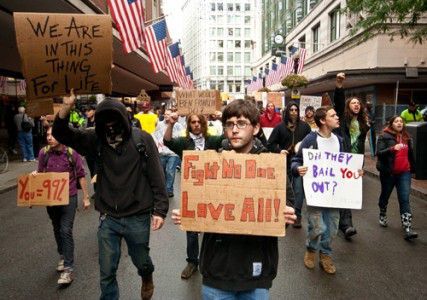
A Suffolk Superior Court judge ruled Wednesday that Occupy Boston activists no longer have the right to sleep or live in their makeshift tent-city in Dewey Square, according to a memorandum about the decision.
In her decision, Judge Frances McIntyre denied the protestors’ motion for an injunction that would have prevented the city from evicting occupiers from their encampment in the center of Boston’s financial district, according to the memo. She also vacated the temporary restraining order filed in mid-November that barred police from removing “individuals, tents, or personal belongings” from the site.
Despite the ruling, the City does not have any immediate plans to begin evicting occupiers, the lawyers representing Occupy Boston said, but many participants in the Occupy Boston movement expressed wariness Wednesday evening.
“There was some panicking earlier,” said David Lehnert, 19, of Framingham, referring to occupiers’ initial reactions to the court ruling.
After hearing testimony from four representatives from Occupy Boston, city officials, and the Rose Fitzgerald Kennedy Greenway Conservancy – the group that owns the site of Occupy Boston – McIntyre drew a distinction between activists “exercising their expressive rights” under the First Amendment and actually living in the Square, according to the memo.
“The act of occupation, this court has determined as a matter of law, is not speech,” wrote McIntyre in the memo. “Nor is it immune from criminal prosecution for trespass or other crimes.”
She ruled that although setting up tents, sleeping and practicing self-governance do constitute “expressive conduct,” Occupy Boston should still abide by “City and Park regulations and restrictions.”
One of the attorneys for the Occupy Boston group, Benjamin Wish, who spoke at an emergency General Assembly meeting Wednesday evening, said that McIntyre’s decision was a difficult one to make. The case, he said, has no legal precedents.
“These are hard questions,” Wish said, “But I think that she worked hard at it. She was always posing piercing questions to both sides.”
Standing huddled together underneath dripping umbrellas and hoods, about 150 people convened in Dewey Square at about 7 p.m. to discuss the decision. Facing a wall covered in posters and artwork, activists argued about what freedom of speech extends and about the symbolism of the movement.
“The point is that the message of occupying is that we are the 99 percent, not that we’re living here,” said Occupier Catherine Hoffman. “To me the message is far broader than that.”
A representative from the Massachusetts chapter of the National Lawyers Guild, Jeff Feuer, outlined the steps that Occupy Boston attorneys will take in the next few days.
“Tomorrow we file a motion for a stay so that the judges order doesn’t take effect,” he said, emphasizing that no matter what Occupy will seek to appeal the court’s decision.
A major point of contention, Feur and Wish said, was the judge’s understanding that Occupy Boston would permanently occupy Dewey Square.
McIntyre defined the occupation as “the seizing and holding of land of the Commonwealth” that is “viewed as a hostile act, an assertion of possession against the rights of another,” in her memo.
Feur and Wish said that in the appeal, they plan to dispute the Greenway Conservancy’s assertion that the Occupy movement has rendered the Square unusable to the general population, citing the movement’s policy of openness to everyone.
Boston Mayor Thomas Menino sided with McIntyre.
“We applaud the judge for clearly recognizing the City’s authority to protect all of our residents, including those currently at Dewey Square,” Menino said in a statement posted on the City’s website on Wednesday. “Our first priority has always been and will always be to ensure the public’s health and safety.”
Although a police officer at Dewey Square reaffirmed that the city hasn’t informed officers of any plan to evict protestors from the encampment, many of the protesters presented plans for raids to the camp.
“We need evacuation plans,” said an occupier, who didn’t identify herself as she addressed the crowd gathered in the Square. “We need to prepare ourselves.”






















































































































